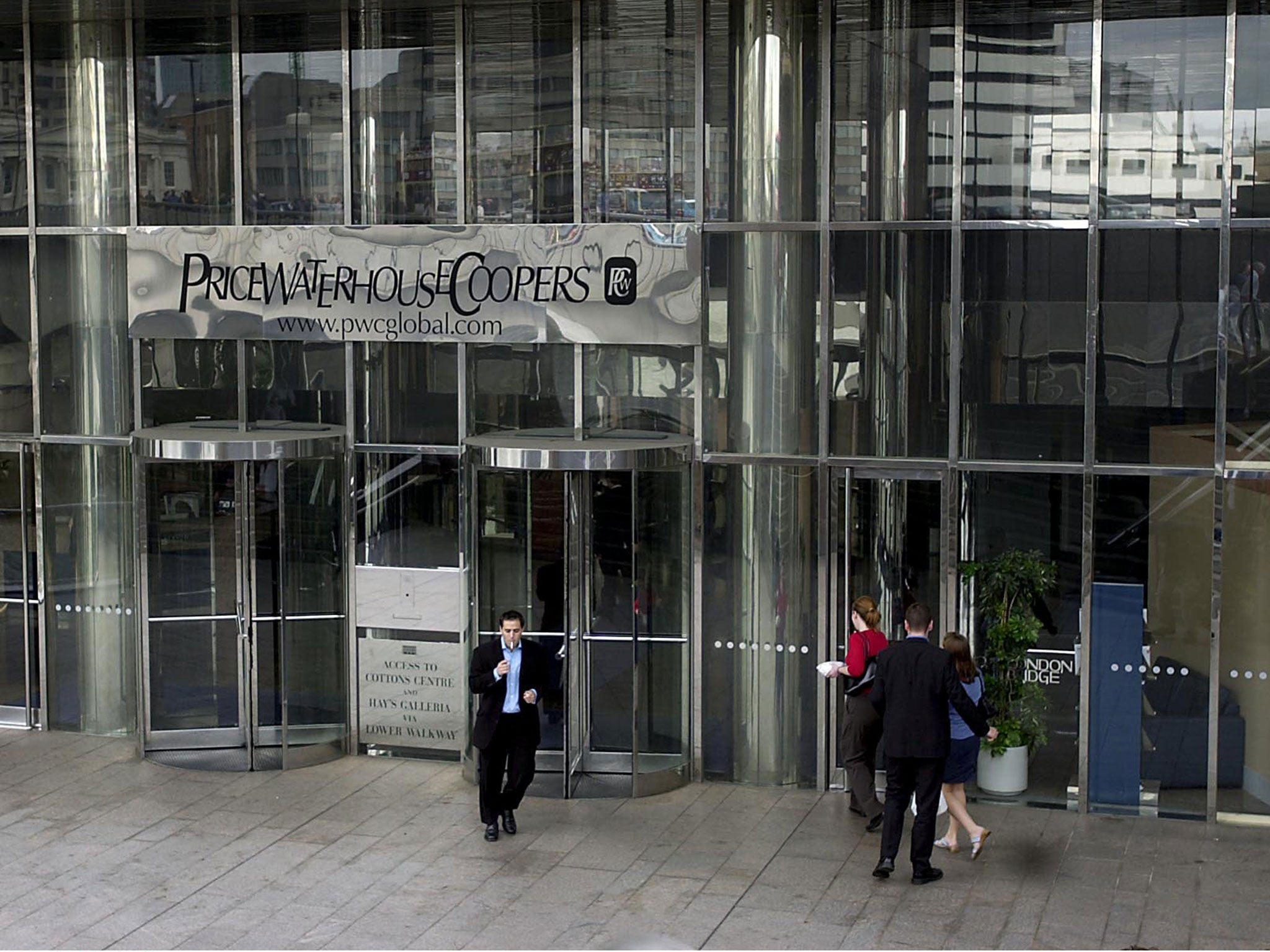PwC's friends keep it well-oiled with taxpayers' money

Your support helps us to tell the story
From reproductive rights to climate change to Big Tech, The Independent is on the ground when the story is developing. Whether it's investigating the financials of Elon Musk's pro-Trump PAC or producing our latest documentary, 'The A Word', which shines a light on the American women fighting for reproductive rights, we know how important it is to parse out the facts from the messaging.
At such a critical moment in US history, we need reporters on the ground. Your donation allows us to keep sending journalists to speak to both sides of the story.
The Independent is trusted by Americans across the entire political spectrum. And unlike many other quality news outlets, we choose not to lock Americans out of our reporting and analysis with paywalls. We believe quality journalism should be available to everyone, paid for by those who can afford it.
Your support makes all the difference.It is perhaps the most common revolving door between the City and Westminster: the transit between the Big Four consultants and Whitehall departments.
The Big Four – that’s EY (better known by its old name of Ernst & Young), KPMG, Deloitte and PriceWaterhouseCoopers, now known as PwC, all have a relationship with government that can at best be called symbiotic, at worst, sinister.
Every year, perhaps hundreds of staff from these firms will work on secondments to various Whitehall departments. They are there ostensibly to bring private sector rigour to a government perceived to have a tendency towards wastefulness and naivety when procuring goods and services.
The question is, does this free offer of help come at any other cost to the taxpayer?
For cynics, the revolving door brings the firms two things: influence in government and an inside edge when they come to advise their clients in the private sector. The firms’ FTSE 100 company customers pay extremely well to learn what government is thinking on policy areas such as tax, planning, foreign affairs.
For those of a cynical bent, there’s a third reason the firms might offer such services for free: to help give themselves an advantage when it comes to winning paid contracts with government. Whitehall departments – and their operations around the country – are the biggest procurer of services around. And accountancy firms are among the biggest suppliers.
Scrutiny of the spending ledgers of one department alone – the Department of Work and Pensions– shows PwC billed for £343,749 in November last year, with a further £237,300 in July.
Political parties use accountants on secondment too. Figures from the Electoral Commission collated by The Independent show PwC supplied services and staff worth £642,000 to Labour in the past five years, £490,000 to the Liberal Democrats and £89,000 to the Tories. The accountant almost always provided these services for free: a non-cash donation, in other words.
Andrew Simms, a researcher at Global Witness, has researched extensively the links between the Big Four and the political and Whitehall machine.
He has described how conflicts of interest are “built in to the very DNA” of the big professional services firms. He argues it is wrong that they are working both for the corporations that need to be regulated and the government bodies who do the regulating.
The accountancy firms argue it is their duty to take part in civic society. As PwC states on its website: “As a leading professional services firm our responsibility is to promote a robust and independent legislative and regulatory framework that meets the needs of the wider economy and assist policy-makers’ deliberations.”
However, it goes on to subtly admit that part of this is to lobby on its own behalf, stating one of its three purposes of engaging with those in government as “to encourage policy-makers to act in the public interest without imposing disproportionate measures that will have a detrimental effect on the firm’s ability to facilitate growth.”
And how does PwC facilitate economic growth? By advising companies how to increase their profits, and billing them handsomely for the service.
The thick of it: Links between PwC and Whitehall
1. John Whiting
Previously a tax partner at PwC, he is now tax director at the Office of Tax Simplification, reporting to ministers. He is also a member of the HMRC board.
2. Graham Williams
After more than 30 years with PwC, he now chairs the Defence Audit Committee and is a non-executive board member of the body, a sub-committee of the Defence Board which looks into accounting, anti-fraud policies and the management of risk.
3. Dr Andrew Sentance
He joined PwC in 2011 as its senior economic adviser after serving on the Bank of England’s Monetary Policy Committee.
4. Mark Hoban
The Conservative MP for Fareham worked as a senior manager at PwC. He was Financial Secretary to the Treasury from 2010 to 2012.
Join our commenting forum
Join thought-provoking conversations, follow other Independent readers and see their replies
Comments